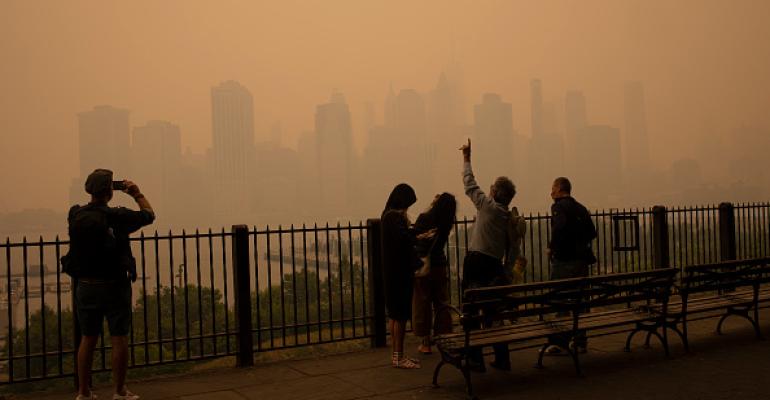The images from New York, Philadelphia, and Washington, D.C., in early June have been startling: a deep yellow haze shrouded each city’s skyline in the middle of the day, courtesy of wildfires burning out of control hundreds of miles away in eastern Canada.
The haze has been so bad that New York’s LaGuardia Airport halted most inbound flights on June 7 and had a reduced schedule on June 8. In addition, the air-quality score in several mid-Atlantic cities briefly rose above 400; the Environmental Protection Agency says that readings above 150 are unhealthy for everyone, not just people with certain conditions and sensitivities.
For meeting hosts, the wildfires are more than just an inconvenience. With attendee health and well-being a primary consideration in the post-pandemic environment, planners should exercise due diligence if their meeting takes place in a city with air-quality issues.
Besides moving outdoor receptions to indoor locations, planners can ensure that the air quality for attendees is good for the entirety of a meeting even if the air outside is unhealthy. Since the Covid pandemic, many hotels have upgraded their HVAC systems to provide for better air filtration. For instance, MERV-13 and HEPA filters have become commonplace, as they capture foreign particles as small at three microns—and wildfire particulate matter is generally between three and 10 microns—before pushing the air throughout a property. For maximum effectiveness, planners should ask about when those filters were last replaced.
On the other hand, one HVAC setting that was vital to keeping hotel guests safe during Covid is precisely the wrong approach for keeping people safe when wildfires pollute the air. In a September 2020 MeetingsNet article, Mark Herrera, director of education and life safety for the International Association of Venue Managers, said that “while it costs more to draw air from the outside and cool it, that is what should be done” to prevent Covid transmission among guests. This meant that hotels should disable an HVAC feature called demand-control ventilation, and also make sure that air-side economizers are used to the fullest, which would maximize outside-air exchange.
But in a situation where outside air is unhealthy, planners should insist that the property enable demand-control ventilation while minimizing the effect of air-side economizers. These two tactics will allow for indoor air to be filtered and recirculated while keeping outside air from coming into the HVAC system. Lastly, individual meeting rooms that are located near doors leading directly outside should remain closed as much as possible during an event. Portable HEPA and MERV-13 air purifiers are also a possibility in rooms of up to 1,000 square feet.





